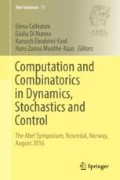Abstract
This is a survey on the theory of Markoff, in its two aspects: quadratic forms (the original point of view of Markoff), approximation of reals. A link wih combinatorics on words is shown, through the notion of Christoffel words and special palindromes, called central words. Markoff triples may be characterized, by using some linear representation of the free monoid, restricted to these words, and Fricke relations. A double iterated palindromization allows to construct all Markoff numbers and to reformulate the Markoff numbers injectivity conjecture (Frobenius, Sitzungsberichte der Königlich Preussischen Akademie der Wissenschaften zu Berlin 26:458–487, 1913).
Access this chapter
Tax calculation will be finalised at checkout
Purchases are for personal use only
Notes
- 1.
The free monoid A ∗ is the set of words (= strings = finite sequences) on the set A, including the empty one; this is a monoid, the product of two words being the concatenation.
- 2.
This means that w = uv and \(\tilde w=vu\) for some words u, v.
- 3.
Frobenius states it, in two different forms, as an open problem, not a conjecture [19] p. 601 and 614.
References
Aigner, M.: Markov’s Theorem and 100 Years of the Uniqueness Conjecture. Springer, Berlin (2013)
Berstel, J., de Luca, A.: Sturmian words, Lyndon words and trees. Theor. Comput. Sci. 178, 171–203 (1997)
Berstel, J., Lauve, A., Reutenauer, C., Saliola, F.: Combinatorics on Words: Christoffel Words and Repetitions in Words. CRM Monograph Series. American Mathematical Society, Providence (2008)
Berthé, V., de Luca, A., Reutenauer, C.: On an involution of Christoffel words and Sturmian morphisms. Eur. J. Comb. 29, 535–553 (2008)
Bombieri, E.: Continued fractions and the Markoff tree. Expo. Math. 25, 187–213 (2007)
Borel, J.-P., Laubie, F.: Quelques mots sur la droite projective réelle. Journal de Théorie des Nombres de Bordeaux 5, 23–51 (1993)
Brlek, S., Lachaud, J.O., Provençal, X., Reutenauer, C.: Lyndon + Christoffel = digitally convex. Pattern Recogn. 42, 2239–2246 (2009)
Calkin, N., Wilf, H.S.: Recounting the rationals. Am. Math. Mon. 107, 360–363 (2000)
Cassels, J.W.S.: The Markoff chain. Ann. Math. 50, 676–685 (1949)
Cassels, J.W.S.: An Introduction to Diophantine Approximation. Cambridge University Press, Cambridge (1957)
Christoffel, E.B.: Observatio arithmetica. Annali di Matematica Pura ed Applicata 6, 145–152 (1875)
Cohn, H.: Approach to Markoff’s minimal forms through modular functions. Ann. Math. 61, 1–12 (1955)
Cohn, H.: Growth types of Fibonacci and Markoff. Fibonacci Quart. 17, 178–183 (1979)
Cusick, T.W., Flahive, M.E.: The Markoff and Lagrange Spectra. American Mathematical Society, Providence (1989)
de Luca, A.: Sturmian words: structure, combinatorics, and their arithmetics. Theor. Comput. Sci. 183, 45–82 (1997)
de Luca, A., de Luca, A.: Pseudopalindrome closure operators in free monoids. Theor. Comput. Sci. 362(1–3), 282–300 (2006)
Dickson L.E.: Studies in the Theory of Numbers. Chelsea, New York (1957) (first edition 1930)
Fricke, R.: Ueber die Theorie der automorphen Modulgruppen. Nachrichten von der Königlichen Gesellschaft der Wissenschaften zu Göttingen 91–101 (1896)
Frobenius, G.F.: Über die Markoffschen Zahlen. Sitzungsberichte der Königlich Preussischen Akademie der Wissenschaften zu Berlin 26, 458–487 (1913)
Graham, R.L., Knuth, D., Patashnik, O.: Concrete Mathematics, 2nd edn. Addison Wesley, Reading (1994)
Hurwitz, A.: Ueber die angenäherte Darstellung der Irrationalzahlen durch rational Brüche. Mathematische Annalen 39, 279–284 (1891)
Justin, J.: Episturmian morphisms and a Galois theorem on continued fractions. Theor. Inform. Appl. 39, 207–215 (2005)
Klette, R., Rosenfeld, A.: Digital straightness – a review. Discret. Appl. Math. 139, 197–230 (2004)
Korkine, A., Zolotareff, G.: Sur les formes quadratiques. Mathematische Annalen 6, 366–389 (1873)
Lothaire, M.: Algebraic Combinatorics on Words. Cambridge University Press, Cambridge (2002)
Markoff, A.A.: Sur les formes quadratiques binaires indéfinies. Mathematische Annalen 15, 381–496 (1879)
Markoff, A.A.: Sur les formes quadratiques binaires indéfinies (second mémoire). Mathematische Annalen 17, 379–399 (1880)
Morse, M., Hedlund, G.A.: Symbolic dynamics II: sturmian trajectories. Am. J. Math. 62, 1–42 (1940)
Perrine, S.: La théorie de Markoff et ses développements. Tessier et Ashpool, Chantilly (2002)
Perron, O.: Über die Approximationen irrationaler Zahlen durch rationale II. Sitzungsbereich der Heidelberger Akademie der Wissenschaften 8, 2–12 (1921)
Remak, R.: Über indefinite binäre quadratische Minimalformen. Mathematische Annalen 92, 155–182 (1924)
Reutenauer, C.: Christoffel words and Markoff triples. Integers 9, 327–332 (2009)
Reutenauer, C.: From Christoffel Words to Markoff Numbers. Oxford University Press (2018, to appear)
Reutenauer, C., Vuillon, L.: Palindromic closures and Thue-Morse substitution for Markoff numbers. Unif. Distrib. Theory 12, 25–35 (2017)
Series, C.: The geometry of Markoff numbers. Math. Intell. 7, 20–29 (1985)
Smith, H.J.S.: Note on continued fractions. Messenger Math. 6, 1–14 (1876)
Author information
Authors and Affiliations
Corresponding author
Editor information
Editors and Affiliations
Rights and permissions
Copyright information
© 2018 Springer Nature Switzerland AG
About this paper
Cite this paper
Reutenauer, C. (2018). Combinatorics on Words and the Theory of Markoff. In: Celledoni, E., Di Nunno, G., Ebrahimi-Fard, K., Munthe-Kaas, H. (eds) Computation and Combinatorics in Dynamics, Stochastics and Control. Abelsymposium 2016. Abel Symposia, vol 13. Springer, Cham. https://doi.org/10.1007/978-3-030-01593-0_24
Download citation
DOI: https://doi.org/10.1007/978-3-030-01593-0_24
Published:
Publisher Name: Springer, Cham
Print ISBN: 978-3-030-01592-3
Online ISBN: 978-3-030-01593-0
eBook Packages: Mathematics and StatisticsMathematics and Statistics (R0)

